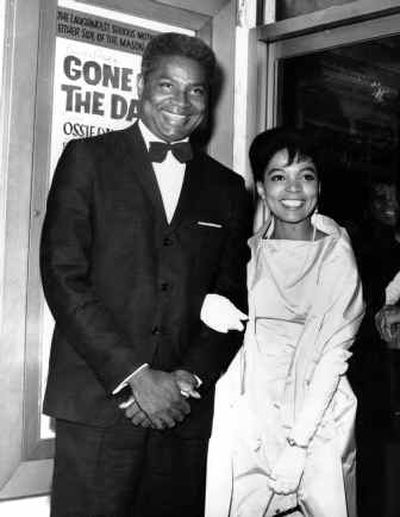Ossie Davis, ‘gentle giant’ as artist, activist

He was a voice for justice – and what a voice it was.
Ossie Davis, 87, the actor, writer and social activist who died Friday, had the kind of rich, soulful, sonorous delivery that seemed to arise as much from his conscience as his vocal cords.
But it wasn’t just timbre and elocution that made Davis, who starred on Broadway and in movies such as “Do the Right Thing” (1989) and in TV productions such as “Roots: The Next Generations” (1979), famous and beloved.
Davis and his wife, actress Ruby Dee, who survives him, seemed always in the center of a political storm. They were blacklisted during the McCarthy era for communist sympathies; they marched and picketed in major civil rights demonstrations in the 1960s. Davis also delivered the eulogy at Malcolm X’s funeral in 1965.
And it was Davis who gave voice to the United Negro College Fund mantra, “A mind is a terrible thing to waste,” in the well-known ad campaign.
“There was such a presence in that voice,” said Eleanor Traylor, chairwoman of the Howard University English Department. “It reached out to speak of a seasoned humanity. It was just irresistible.”
Chuck Smith, resident director at the Goodman Theatre, declared, “The black community has lost its North Star.”
With Dee, Davis was able to combine art and politics, advancing the causes that mattered to him while creating memorable characters on stage and in film and television. And he did it, from all accounts, with grace and humility.
Harry Lennix, an actor who appeared in the Spike Lee film “Get on the Bus” (1996) with Davis, called him “an extraordinarily literate man who always underestimated his impact – not just in the arts, but in politics. He was a gentle giant.”
Davis, who reportedly had a history of heart problems, was found dead in a Miami Beach hotel, apparently of natural causes. He had begun filming the movie “Retirement” in the Florida city four days earlier.
“He was a kind of pathfinder as a performer,” said John Lahr, author and theater critic for The New Yorker. “Essentially, there are only a handful of African American actors who found a way of mediating between the white and black worlds and were accepted by both. Ossie Davis was one of them.”
But being an actor wasn’t his original goal. Davis, born Raiford Chatman Davis in 1917 in Cogdell, Ga., wanted to be a playwright. (The nickname “Ossie,” according to several sources, arose after friends misunderstood his mother’s pronunciation of “R.C.”) In 1935 he made his way to Howard University in Washington, D.C., to hone his craft, and then in 1939, headed for New York to get a taste of the real thing.
Acting jobs came easier than writing gigs, and he made his Broadway debut in 1946 in a play titled “Jeb,” about a soldier who returns from World War II and faces bigotry. The production closed after a week, but it lasted long enough for Davis to set his cap for his co-star, a young performer named Ruby Dee. Two years later, they were married.
Their professional and personal partnership often is compared with the Alfred Lunt-Lynn Fontaine or Hume Cronyn-Jessica Tandy matchups, but with a critical difference: Davis and Dee were black, which limited their theatrical employment opportunities in a nation only fitfully emerging from the shadow of segregation.
Davis and Dee became famous both as performers and activists. They acted, they wrote, they marched on behalf of political issues in which they passionately believed.
In 1959, Davis appeared in the original Broadway production of “A Raisin in the Sun” by Lorraine Hansberry. In 1961, he wrote and starred in the comedy “Purlie Victorious.”
Broadway theaters dimmed their marquee lights briefly Friday night in Davis’ honor.
Actors, Lahr said, are “technicians of the spirit. He was one of the guiding African American theatrical spirits of his time.”
And that time stretched across decades. Davis worked in films and on television as well as on Broadway. His movies included “Jungle Fever” (1991). He was the narrator for the TV series “Evening Shade.” He wrote three children’s books. From 1980-82, he and Dee hosted a PBS series, “With Ossie and Ruby.” Last year, they were honored by the Kennedy Center – as a couple.
Indeed, what the Goodman’s Smith remembers about Davis is not just his creative talent, but his love for Dee. “The memory I have that sticks out is when he was here (in Chicago) being interviewed at the Art Institute (for a videotaped archive of African American history). You could see the love that he and Ruby Dee shared. To see them together, to see the love they had for each other — it shone all over the stage.”
Dee reportedly was working on a film project in New Zealand at the time of Davis’ death.
Davis returned often to Howard to speak with classes, Traylor said, and students were always enthralled. They’d seen him in Spike Lee movies, in Eddie Murphy’s remake of “Dr. Doolittle” (1998), and thus he was revered even though he hailed from their grandparents’ generation.
“There are people among us that we know primarily through the entertainment industry – but who are, like Ossie Davis, serious intellectuals,” Traylor said. “He actively participated in and supported the things he believed in, the values he sought for humanity.
“The students just didn’t want to let him go – just like we don’t want to let him go, at this moment.”